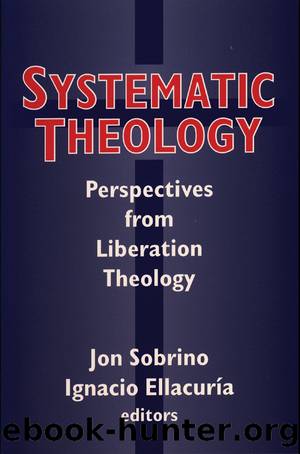Systematic Theology: Perspectives from Liberation Theology (Readings from Mysterium Liberationis) (Faith Meets Faith) by Ellacuria Ignacio & Sobrino Jon

Author:Ellacuria, Ignacio & Sobrino, Jon [Ellacuria, Ignacio]
Language: eng
Format: epub
Publisher: Maryknoll Fathers
Published: 2015-03-30T00:00:00+00:00
8
The Holy Spirit
JOSÃ COMBLIN
Latin American theology, we must acknowledge, has not developed a specific theology of the Holy Spirit. Until now, theology on our continent has been in the debt of the theology of the Latin church, which, instead of developing a theology of the Holy Spirit, has only repeated what it has received from the patristic era. So far, Latin American theologyâlike all Latin-tradition theology, both Protestant and Catholicâoperates under the sign of a âchristomonism.â
Instead, a theology of the Holy Spirit is something we can discern in outline, but do not yet have in hand. From a point of departure in the basics of Latin American theology, we can project where such a theology would go.
I. EXPERIENCE OF THE HOLY SPIRIT
Very frequently the experience of the Holy Spirit is anonymous. In theology, just as among the Christian people, we hear simply of the experience of a Dios liberador âa God who delivers. Admittedly, the impact of the Hebrew scriptures, especially the texts of the Exodus, have been very powerful. The language of our experience takes its inspiration there. While the content of the experience has been enriched by the Christian scriptures, the formulation often remains faithful to its Hebrew sources.
Theology, like the popular Christian religious experience itself, knows very well that the Dios liberador will not deliver the people of God by means of physical miracles, as in Egypt or the wilderness. God will not deliver from without by sheer blows of the divine will. God delivers the people by means of the forces and energies that God places within the people, by means of the enlightenment and prophetic charisma of mighty leaders, by means of the union and solidarity of living communities, and by means of the enthusiasm of the multitudes that these communities and prophets succeed in arousing. Latin American Christians recognize the God of liberation and feel the presence of such a God in their very midst, acting in their own actions and commitments. This Dios liberador is the Holy Spiritâwhether known by name or not.
In the heat of political action, Christians may feel that they are operating in terms only of social or political forces and factors. They may not recall the sources of their action. However, when the poor rise up to a collective action in this world, sheer social forces are surely not at work. After all, what we have here is a resurrection of the human being, a new birth of whole peoples, an utter transformation of persons.
Whence do such movements proceed? From the presence of the Holy Spirit. At the level of this divine presence, the (objectively) theological life and the political life constitute a single action. Faith, hope, charity, and political action are one reality in the human person who is really and concretely born to a new life. It is not a matter of mere pragmatic options. It is a matter of the very existence of the people: the Holy Spirit is involved here. At the heart of these experiences of historical actions, the liberative power of the Spirit is present.
Download
This site does not store any files on its server. We only index and link to content provided by other sites. Please contact the content providers to delete copyright contents if any and email us, we'll remove relevant links or contents immediately.
Christian Ethics by Wilkens Steve;(854)
Christian Ethics for a Digital Society by Kate Ott(775)
Fearfully and Wonderfully Made by Philip Yancey & Paul Brand(755)
God and the Multiverse by Victor J. Stenger(669)
Numbers by Ronald B. Allen(629)
How to Read Slowly by James W. Sire(610)
Christian Ethics: An Introduction to Biblical Moral Reasoning by Wayne Grudem(589)
The City of God by Saint Augustine & Marcus Dods(565)
Morality by Jonathan Sacks(564)
Monastic Archaeology by Unknown(561)
The Technological System by Jacques Ellul(543)
Amish Grace by Donald B. Kraybill & Nolt Steven M. & Weaver-Zercher David L(521)
The Disabled Church by Rebecca F. Spurrier;(516)
Jesus: A New Vision by Whitley Strieber(516)
Death of the Doctor by Unknown(512)
Children of Lucifer; The Origins of Modern Religious Satanism by Ruben van Luijk(503)
Critical Writings by Joyce James;(499)
Redeeming Sociology by Vern S. Poythress(477)
The Church in the Early Middle Ages by G.R. Evans(464)
